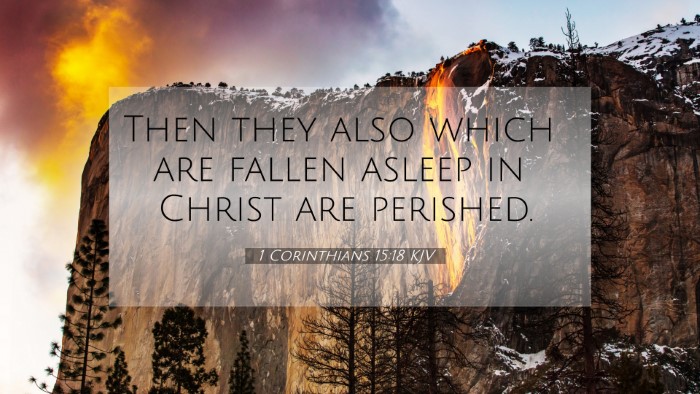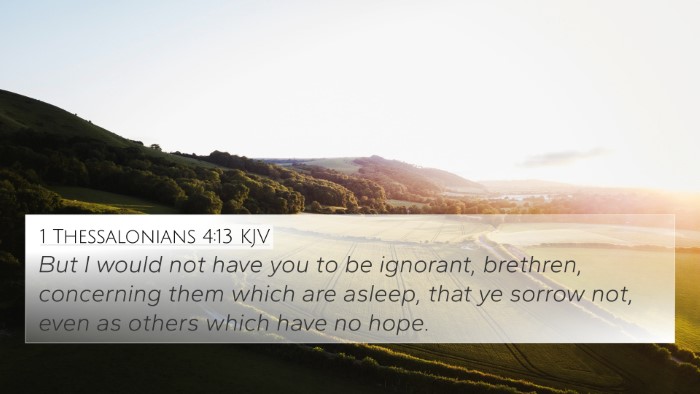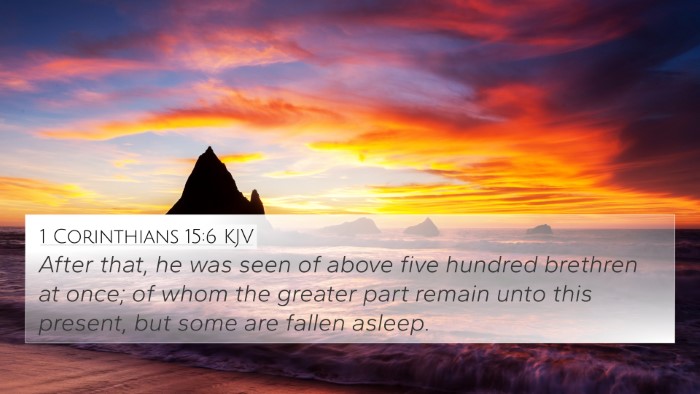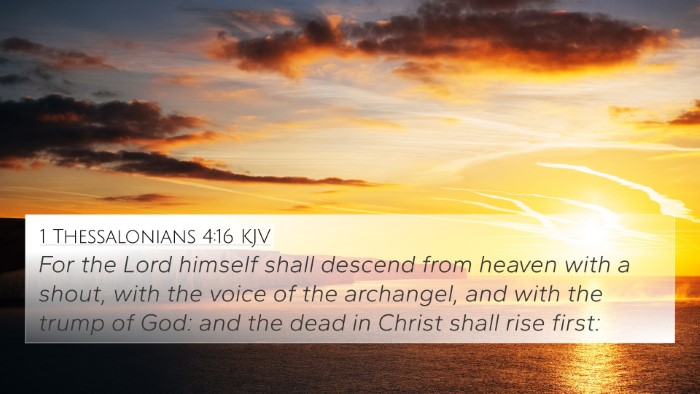Understanding 1 Corinthians 15:18
1 Corinthians 15:18 states, "Then those also who have fallen asleep in Christ have perished." This verse is a profound statement on the implications of the resurrection and the fate of those who have died in faith. Below is a comprehensive summary exploring the meanings derived from various public domain commentaries, integrating insights from Matthew Henry, Albert Barnes, and Adam Clarke.
Overview of the Verse
This verse comes in the context of Paul's discussion about the resurrection of the dead. If there is no resurrection, then the faith of Christians is in vain, and those who have died believing in Christ are lost forever. This verse acts as a pivotal point in Paul's argument about the necessity and assurance of the resurrection.
Commentary Insights
-
Matthew Henry:
Henry emphasizes that the resurrection is central to Christian faith. Without it, the hope provided to believers is null, and those who have died in faith are utterly lost. Furthermore, if Christ is not raised, then Christian faith is founded on a delusion.
-
Albert Barnes:
Barnes highlights the emotional weight of this assertion. He implies that the thought of death being the end for believers is a grave state — one lacking hope. This illustrates the critical nature of the resurrection doctrine within the Christian narrative.
-
Adam Clarke:
Clarke presents a thorough examination of the Greek wording used in the verse. He points out that 'fallen asleep' is a euphemism for death, particularly for believers. This suggests a temporary state waiting for resurrection, reinforcing the notion that faith in Christ provides ultimate hope even beyond death.
Cross-References and Connections
This verse can be analyzed alongside several others that illuminate its meaning and theological implications. Some relevant cross-references include:
- 1 Thessalonians 4:13-14 - Discusses the hope of resurrection for believers who have died.
- Romans 6:5 - Affirms that if we are united with Christ in His death, we will also be united with Him in His resurrection.
- John 11:25-26 - Jesus declares, "I am the resurrection and the life..." underscoring the hope in life after death.
- 2 Corinthians 5:1 - Paul speaks of the eternal house in heaven, contrasting earthly dwelling with eternal one.
- Philippians 3:20-21 - Focuses on the transformation of believers' bodies at resurrection.
- Job 19:25-26 - Job's declaration of hope in a Redeemer that will stand upon the earth at the last days.
- Hebrews 11:13-16 - Highlights that the faithful look for a city whose builder and maker is God, indicating a hope beyond physical death.
Thematic Bible Verse Connections
The themes in 1 Corinthians 15:18 resonate with several central doctrines of Christianity, including:
- Resurrection of the dead
- Hope in Christ
- Victory over death
- Eternal life
Applying the Insights
For those engaging in Bible study or sermon preparation, utilizing tools for Bible cross-referencing can provide deeper insights into the connections between Bible verses. Understanding how 1 Corinthians 15:18 links with other scriptures can enhance knowledge of Biblical themes concerning death and resurrection. Here's a brief guide on how to approach this:
- Use a Bible concordance to find key themes and concepts.
- Consider utilizing a cross-reference Bible study method to explore related passages.
- Identify connections between Old and New Testament teachings through thematic studies.
Conclusion
1 Corinthians 15:18 serves not only as a somber reminder of the fate of those who die without hope but also as a profound encouragement for believers. The assurance of resurrection is pivotal to Christian doctrine, underscoring the victory of Christ over death, providing believers hope that transcends the grave. By engaging in comparative Bible verse analysis and cross-referencing biblical texts, one can gain a more robust understanding of the assurance offered in Christ.
Further Reflection
What can be learned from 1 Corinthians 15:18 and its related verses shapes our understanding of Christian hope. It challenges believers to reflect on the truths of life, death, and resurrection, anchoring their faith beyond this world.






